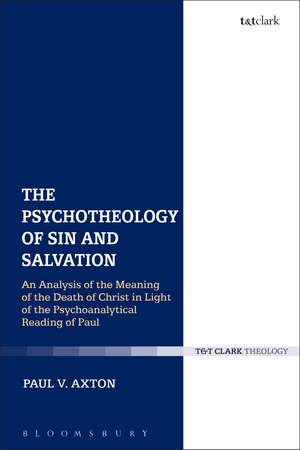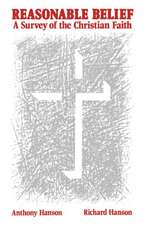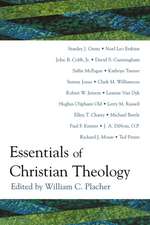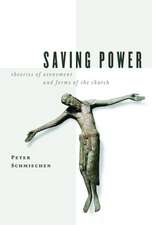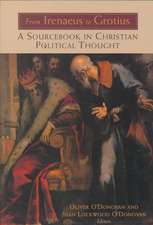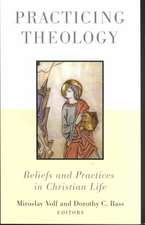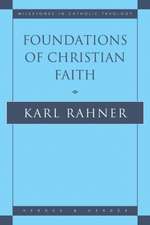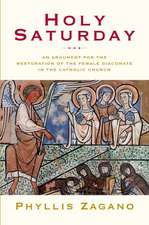The Psychotheology of Sin and Salvation: An Analysis of the Meaning of the Death of Christ in Light of the Psychoanalytical Reading of Paul
Autor Paul V. Axtonen Limba Engleză Paperback – 27 iun 2018
| Toate formatele și edițiile | Preț | Express |
|---|---|---|
| Paperback (1) | 237.02 lei 43-57 zile | |
| Bloomsbury Publishing – 27 iun 2018 | 237.02 lei 43-57 zile | |
| Hardback (1) | 773.39 lei 43-57 zile | |
| Bloomsbury Publishing – 21 oct 2015 | 773.39 lei 43-57 zile |
Preț: 237.02 lei
Preț vechi: 272.41 lei
-13% Nou
Puncte Express: 356
Preț estimativ în valută:
45.36€ • 47.09$ • 37.82£
45.36€ • 47.09$ • 37.82£
Carte tipărită la comandă
Livrare economică 24 martie-07 aprilie
Preluare comenzi: 021 569.72.76
Specificații
ISBN-13: 9780567682499
ISBN-10: 0567682498
Pagini: 232
Dimensiuni: 156 x 234 x 12 mm
Greutate: 0.33 kg
Ediția:NIPPOD
Editura: Bloomsbury Publishing
Colecția T&T Clark
Locul publicării:London, United Kingdom
ISBN-10: 0567682498
Pagini: 232
Dimensiuni: 156 x 234 x 12 mm
Greutate: 0.33 kg
Ediția:NIPPOD
Editura: Bloomsbury Publishing
Colecția T&T Clark
Locul publicării:London, United Kingdom
Caracteristici
Engages with classic concepts such as sin and salvation and demonstrates their actual status as to do with the lived reality of identity.
Notă biografică
Paul V. Axton is Professor of Theology and Missions at Central Christian College of the Bible, USA. He spent 15 years as the president of American Christian College in Tokyo, Japan, where he was also a preacher and missionary.
Cuprins
IntroductionChapter One: The Subject of the Death DriveChapter Two: The Subject of the LieChapter Three: Living with the Lie of Radical Freedom and Radical EvilChapter Four: Sin Deceived MeChapter Five: Sex and Death with the Universal SubjectChapter Six: Dying with Christ in ZizekChapter Seven: The Context of Romans: The Universal Problem of Sin and Death Overcome in Christ Chapter Eight: The Law of Sin and DeathChapter Nine: Life beyond the Law of SinChapter Ten: The Law of the Spirit of LifeConclusion
Recenzii
The strength of the work lies in its ability to create a theological discourse between Pauline language in Romans 6-8 and contemporary psychoanalytical theory as articulated by Sigmund Freud, Jacques Lacan, and Slavoj Zizek ... Axton's work is impressive in its creativity and breadth of knowledge ... and opens new possibilities for considering Paul's thought.
Rarely has the trajectory of Freud, Lacan, and Zizek been set out with such clarity in pursuit of Pauline theology and rarely has Pauline theology been made to converse so thoroughly with psychoanalysis. The result not only recasts the significance of psychoanalysis in accounting for sine qua law and subjectivity but as importantly, the ways in which a Pauline theology of salvation can speak directly into contemporary accounts of the subject qua law. Axton's book is not only written with a sensitivity usually reserved for analysis, it also delivers the analyst's blow: a true intervention.
The mark of deep insight is to be able to present a creative and insightful nexus of ideas in such a way that afterwards the connections and reconfigurations seem so obvious and natural that it is hard to imagine it being seen any other way. Axton displays just such an insight with Paul and Freudian/Lacanian/Zizekian psychoanalysis. As an expansion of Zizek's expansion upon Lacan's expansion upon Freud that returns to the negated Christian ground of Freud, The Psychotheology of Sin and Salvation brilliantly exposes the resonances between the theological doctrine of sin and the psychoanalytic mystery of the death drive.
Axton applies the work of Zizek and psychoanlaysis (Freudian, Lacanian, and otherwise) to the twin threads of sin and salvation in the Pauline Gospels. It is an exercise in biblical exegesis that is as rigorous as it is creative.
Rarely has the trajectory of Freud, Lacan, and Zizek been set out with such clarity in pursuit of Pauline theology and rarely has Pauline theology been made to converse so thoroughly with psychoanalysis. The result not only recasts the significance of psychoanalysis in accounting for sine qua law and subjectivity but as importantly, the ways in which a Pauline theology of salvation can speak directly into contemporary accounts of the subject qua law. Axton's book is not only written with a sensitivity usually reserved for analysis, it also delivers the analyst's blow: a true intervention.
The mark of deep insight is to be able to present a creative and insightful nexus of ideas in such a way that afterwards the connections and reconfigurations seem so obvious and natural that it is hard to imagine it being seen any other way. Axton displays just such an insight with Paul and Freudian/Lacanian/Zizekian psychoanalysis. As an expansion of Zizek's expansion upon Lacan's expansion upon Freud that returns to the negated Christian ground of Freud, The Psychotheology of Sin and Salvation brilliantly exposes the resonances between the theological doctrine of sin and the psychoanalytic mystery of the death drive.
Axton applies the work of Zizek and psychoanlaysis (Freudian, Lacanian, and otherwise) to the twin threads of sin and salvation in the Pauline Gospels. It is an exercise in biblical exegesis that is as rigorous as it is creative.
